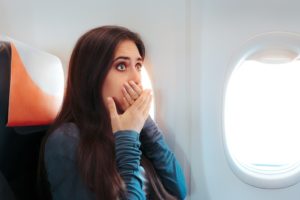Flying phobia is the fear of flying in an aeroplane or other flying vehicle such as a helicopter. This discomfort with flying can be caused by the flying itself or from several other fears such as heights, panic attacks, and feeling trapped, closed-in or out of control. Fear of flying is extremely common and it is believed that approximately 30-50% of people suffer from this fear at some point in their life.
Common causes of flying phobia
One cause of flying phobia could be a previously difficult experience with flying. Whilst actual danger during flight is extremely rare, a person can become anxious or sick while flying which then causes them to worry about future flights. In other words, if someone the feelings triggered during a difficult flight might be re-triggered when the person simply thinks about flying, leading to an overall fear of getting on a plane again, or avoidance of flying.
Another common cause of flying phobia stems from hearing stories about other people’s experiences. This is called ‘vicarious learning’ and occurs when someone hears about another person’s problem and then envision yourself having that same problem. So, when people hear about an aeroplane accident or a difficult flight with turbulence they may imagine themselves in that same situation and this can then develop into a vicarious fear of flying
Further, a fear of flying may actually stem from other problems which have indirectly increased someone’s discomfort when flying. For example, a person may experience a fear of heights or crowds or suffer from panic attacks or claustrophobia (a fear of enclosed spaces) and due to the nature of aeroplanes, these fears are then triggered whilst flying which can develop into a phobia of flying.
Finally, a fear of flying may develop after a period of ongoing stress in someone’s life. A person may have experienced the loss of a loved one, illness in the family, divorce, or experienced some other major change, such as moving or changing jobs. Any stressful period can leave the mind more fragile and vulnerable and subsequently heighten or intensify any anxiety or fears.
Ways to treat flying phobia
There are many different treatment options and techniques that our psychologists can use to help people feel more at ease with flying, however all would come under the umbrella of Cognitive-Behavioural Strategies (CBT). The psychologist may build a person’s trust in the aviation industry and help them to understand their level of safety on a plane (e.g., understanding that flying is the safest mode of transport available). In addition, the psychologist may work with someone to help them learn to sit with feelings of anxiety and worry so that these feelings appear more manageable and do not escalate to a state of panic. Further the psychologist may teach some simple breathing techniques in order to help calm the mind and body during times of stress. Changing breathing patterns and the pace of breathing can be very effective at relaxing muscles and reversing any panic symptoms. The psychologist can also help implement a number of other relaxation techniques and assist people to devise an action plan that allows them to cope with anxiety both in the lead up to and during flights.
If you would like to find out more about our treatment for fear of flying, or to book an appointment with one of our clinical psychologists who provides treatment for this condition, please email or call the clinic on 02 9438 2511.

